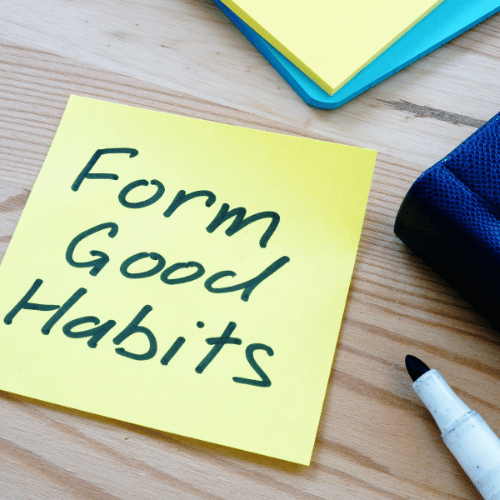- admin
- May 14, 2024
- No Comments
Proven Techniques to Form and Maintain Life-Enhancing Habits for a Better You
Have you ever wondered how some people manage to consistently engage in healthy and productive behaviors? They are able to make and keep good habits, that is the key.
Making habits isn’t just about making brief changes; it’s about forming long-lasting behaviors that make your life better. This article talks about a number of different ways to form habits that can improve your health and productivity.


What is a Habit?
A habit is a behavior that you do without thinking about it because you do it so often. It is something that is done so often that it becomes a natural part of one’s routine and is often done with little or no thought.
How Do Habits Form?
A cue, a routine, and a reward are all parts of the habit loop, which is how habits are formed. The behavior is set off by a cue, the behavior itself is the routine, and the benefit of the behavior is the reward. This loop keeps going, which makes the behavior more automatic and less reliant on motivation over time.
The Psychology Behind Habits
Understanding how habits are formed on a psychological level can make it much easier for you to form new habits. The basal ganglia of the brain is where habits are stored as they are very important for recognizing and acting on patterns. By using what they’ve learned, people can come up with good ways to start and keep new habits.
Core Techniques for Forming Habits
1. The Role of Cue, Routine, and Reward:
It is important to clearly define each part of the habit loop in order to successfully form a new habit. Find a consistent cue, set up a simple routine, and make sure the behavior you want to see will lead to a reward.
2.Small Steps: The steady Approach:
Start with easy-to-handle steps that build up to the bigger habit over time. As you gradually add more of this behavior to your daily life, it will help you stay calm and give you a sense of accomplishment.
3.Consistency Over Intensity:
Pay attention to how often the behavior happens instead of how intense it is. Intense bursts of activity that can lead to burnout are less likely to last and be more effective at forming long-lasting habits than steady, small efforts.


Advanced Strategies for Effective Habit Maintenance
1. Monitoring Progress:
It’s important to keep track of your progress if you want to keep up new habits. You can use journals, apps, or charts to keep track of your progress and mistakes. Not only does this keep you motivated, but it also gives you useful information about what works and what doesn’t.
2.Dealing with Setbacks:
Challenges happen when you’re trying to form a habit. You shouldn’t see them as failures, but as chances to learn and improve your approach. Make changes to your plans based on what these setbacks teach you, and stay flexible as you go.
3.Using Technology for Habit Tracking:
Use technology to help you stick to your habits. There are a lot of apps that can help you remember your habits, keep track of your progress, and even find people who can support you. The process of keeping up with habits can be easier and more fun with these tools.
Lifestyle Integration
- Incorporating Habits into Different Aspects of Life
For habits to really improve your life, they need to be a natural part of many parts of your life. Find ways to make habits a part of your daily life, such as incorporating mindfulness practices into your workday or making exercise a part of your daily routine.
- Balancing Multiple Habits
It’s good to have more than one habit, but it’s important to keep a balance so that one habit doesn’t take over. Set priorities for your habits based on how they affect your life, and try to keep the number of them manageable so you don’t overwork yourself.
Role of Environment in Habit Formation
- Designing Your Environment for Success
Your environment can have a big effect on how well you can make and keep habits. Set up your environment to support your new habits. For example, keep healthy snacks close at hand or create a space just for studying.
- Peer Influence and Social Support
The people around you can also be very important in helping you form habits. Surround yourself with friends and family who will support you and cheer you on. Joining groups of people with similar goals can also help you stay motivated and responsible.


Psychological Techniques to Enhance Habit Formation
- Visualization and Mental Rehearsal
Visualizing yourself doing a new habit can make it much more likely that you will stick with it. Like doing the action, practicing it in your mind helps build a neural pathway in your brain. This practice gets your mind ready for the task, which makes it easier to do with your body.
- Affirmations and Positive Self-Talk
Positive self-talk and affirmations can help you stick to new habits. By telling yourself nice things and believing you can succeed, you create a positive attitude that helps you form habits.
Transforming Bad Habits
- Identifying and Replacing Negative Habits
To change bad habits, you must first be able to clearly see them. Once you know what they are, plan how to replace them with better behaviors. The cue and reward stay the same with this replacement method, but the routine is changed to something healthier.
- The Role of Trigger Management
It’s important to deal with the things that make you do bad things. If stress makes you snack on unhealthy foods, try dealing with it in a healthier way, like going for a walk or doing deep breathing exercises.
Conclusion
Changing habits is a process that has ups and downs, but if you have the right mindset and techniques, you can make changes that last and make your life better. Anyone can change their habits and, by extension, their lives if they understand the psychology behind habits, use strategic approaches, and use both personal and technological support. Remember that persistence, not perfection, is the key to making habits stick.







